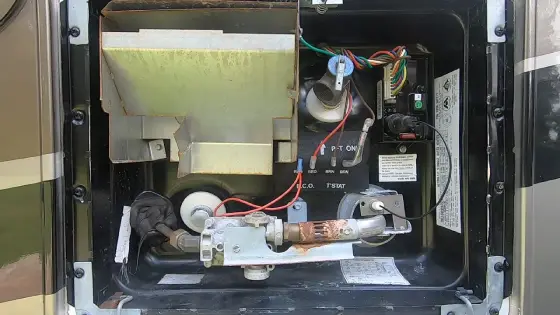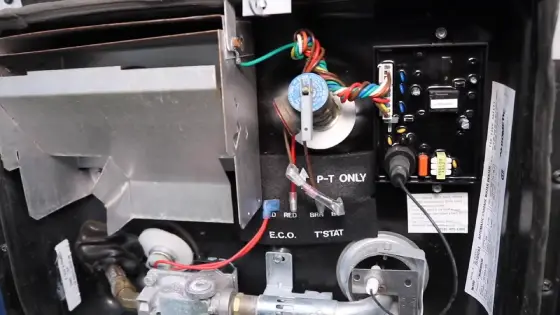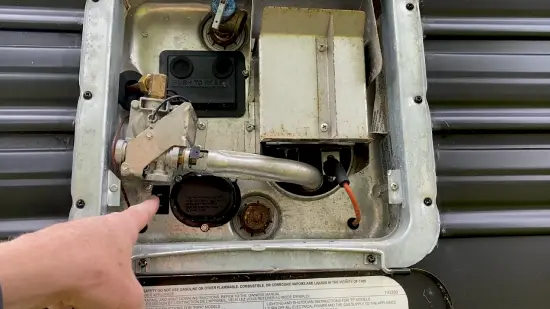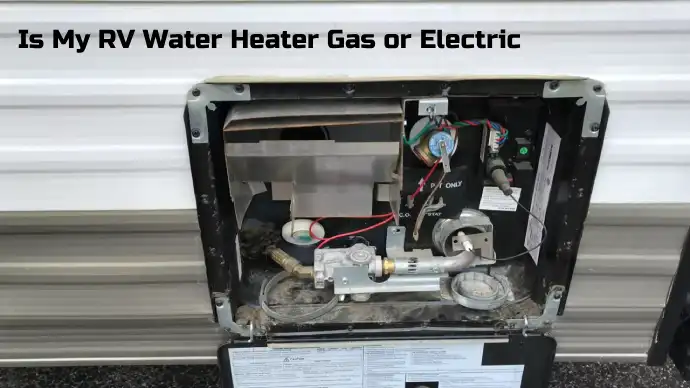Last Updated on December 24, 2023
Navigating your RV’s systems can be confusing for new RVers. One of the most important features of an RV is its water heater, which ensures you have hot water for showers, washing dishes, and other daily tasks. But the question remains, is your RV water heater gas or electric?
Look at the control panel if you wonder whether your RV water heater is fuel or electric. The switch labeled “LP GAS” or “ELECTRIC” is your answer. But if the model number starts with a ‘G’, it is gas-powered; otherwise, if it starts with a ‘C’, it is a combination of gas and electric-powered.
Today, we’ll discuss determining whether an RV water heater is gas-powered or electric. We will also discuss switching from a gas to an electric water heater. So keep reading for more information.
Is My RV Water Heater Gas or Electric: How to Determine?
If you want to figure out whether your RV water heater runs on gas or electric power, simply take a peek at the control panel. The switch marked “LP GAS” or “ELECTRIC” will tell you everything you need. Most RV water heaters are situated in the galley area and have a control panel featuring these switches.
Located to the right of the “LP GAS” toggle, you shall find the “ELECTRIC” toggle. If your RV water heater has both toggles, it runs on a combination of gas and electricity.
An added clue can be found in the first two letters of the model number. If the model number leads with a ‘G’, then it’s gas-powered. If the model leads with a ‘C’, then it’s a hybrid of gas and electric-powered.
How to Switch RV Water Heater From Gas to Electric?

To switch your RV water heater from propane to electric, you’ll need to follow these steps:
- STEP 1. Locate the RV Water Heater Switch
- STEP 2. Locate the Panel Box
- STEP 3. Locate the Control Switch
- STEP 4. Turn ON the Switch
STEP 1. Locate the RV Water Heater Switch
Once inside your RV, you’ll easily spot the water heater switch near the kitchen area. You can turn it off to prevent the propane water heater from running. But before locating the switch, it’s essential to understand whether your water heater in the RV is gas or electric.
If you need more clarification, the easiest way to find out is to check the water heater. Look for a label or tag outside the water heater tank that indicates whether it’s gas or electric. Another way to tell is to check the RV owner’s manual, which should provide information on the type of water heater installed in your RV.
STEP 2. Locate the Panel Box
After identifying the type of heating system in your RV, you need to locate the panel box. This box is usually found on the driver’s side and contains the controls for the water heater and other electrical components.
Look for a rectangular metal box with a hinged cover to find it easily. Some RVs have the panel box outside, while others may have it inside the RV. Once you’ve located the panel box, you can open it to access the water heater components.
Inside the panel box, you will find the circuit board, fuses, and other components that control the operation of the water heater. If your RV has a gas water heater, you will find the gas valve and igniter inside the panel box.
STEP 3. Locate the Control Switch
You can easily find the control switch for your RV’s water heater by searching for a small switch in the bottom left-hand corner of the panel box. This switch is responsible for controlling the electric power to your water heater.
It’s an important component that must be monitored and tested periodically to ensure your water heater is functioning properly. You must open the panel box and inspect the bottom left-hand corner to locate the switch. The switch should be easily visible, and you can turn it on or off depending on your needs.
Remember to switch off your water heater before inspecting the control switch, as this will help prevent any potential accidents. If you need help switching off your water heater, consult your RV’s manual or seek professional help.
STEP 4. Turn ON the Switch
Flip the switch to the ‘ON’ position to activate the water heater’s electric power. This switch is usually located near the water heater or in a control panel. Once the switch is on, the water heater will run on electric power.
It’s important to note that electric power is just one of the options to run your RV water heater. Check your RV manual for the type of water heater you have and the available power options. Some RV water heaters are gas-powered, while others are electric or have both options.
Gas or electric: Which is best for an RV water heater?

When choosing between gas and electric RV water heaters, remember a few key points.
Electrical Limitations:
The electrical service may need more power to run all RV appliances simultaneously. To avoid tripping the electric breaker, you may need to turn off some high-power appliances when using an electric water heater.
Understand the limitations of your RV’s electrical service to get the most out of it. Here are three important things to keep in mind:
- If you have a 30-amp electrical service, you may need to use propane to power your water heater instead of electricity.
- Running high-power appliances like the air conditioning while using the water heater on electricity may cause the electric breaker to trip.
- If you have a 50-amp electrical service, you’ll likely have enough power to run the water heater and other high-power appliances simultaneously.
Longer Heating Time:
Heating water with the RV’s electrical element takes more patience than LP gas, which generally requires a longer heating time. This is because electrical heating elements typically have lower wattage than LP gas burners, which means they heat the water faster.
Moreover, electrical heating is also affected by the environment in which the RV is parked, as colder temperatures can further increase the heating time. Here’s a table that shows the average heating times for a 6-gallon RV water heater using gas and electricity:
| Heating Method | Temperature Rise (°F) | Time to Heat Water (minutes) |
| LP Gas | 120 | 20-30 minutes |
| Electric | 120 | 60–80 minutes |
As you can see, using LP gas to heat water is significantly faster than using the electrical element. But electric heating may be more convenient and cost-effective for RVers who stay at campsites with electrical hookups.
Why choose either, though? Some RV water heaters can run on gas and electricity, offering the best of both worlds, albeit at an extra cost. Now, if you still need to decide whether to keep your RV water heater on electric at all times, consider these factors:
- How frequently do you use hot water
- How long do you plan to stay in your RV
- Have uninterrupted access to electricity
Can an RV Water Heater Be Both Electric and Gas?
For your RV water system, you can pick a combination heater that uses electricity and propane to choose what works best for you. To speed up the heating process, you can safely use the gas and electric elements of the water heater simultaneously when you need hot water quickly.
This method is commonly referred to as simultaneous use and can significantly reduce heating time in your RV. When both elements are on, the gas element heats the water quickly while the electric element maintains the temperature, resulting in near-instant hot water.
Here are some benefits of using a combination heater:
#1 Convenience: You can switch between electricity and propane depending on your needs. If you can access an electrical outlet, you can heat your water and save your propane for other appliances. When boondocking or don’t have access to electricity, you can use the propane option to heat your water.
#2 Cost Savings: A combination heater can save you money on propane usage. Propane can be expensive, and using electricity when available can help reduce your overall costs.
Is it better to always leave an RV Electric water heater on?

You can keep your RV water heater running on electricity all the time for efficiency and convenience. This ensures you have hot water at any moment without waiting for it to heat up. Leaving the water heater on electricity is always safe when the RV is stationary or on the road.
But consider the cost and environmental impact of leaving it on all the time. The electricity to maintain heat can be expensive and increase your carbon footprint.
Should I drain the water heater on my RV before changing the power?
It’s recommended to drain the water heater in your RV before changing the power source or performing any maintenance. This ensures safety by reducing the risk of accidents such as burns or injuries due to pressure inside the tank.
It also aids in maintenance by making it less challenging to work on, and helps prevent damage to the heater. Draining lets you flush out sediment accumulation from the bottom of the tank, leading to a longer lifespan and greater heater efficiency.
Gas or Electric Water Heater: Get the Right RV Heater
The debate between gas and electricity is ongoing in the RV community. It all comes down to your preferences and requirements when choosing an RV water heater.
Gas water heaters are ideal for those who enjoy a bit of risk as they require more maintenance and carry a risk of gas leaks and explosions. Conversely, electric water heaters are perfect for those who prefer the sound of electricity and don’t mind paying a bit more for their energy bills.
But don’t worry too much because regardless of whether you pick gas or electric, your RV water heater will have you covered.



